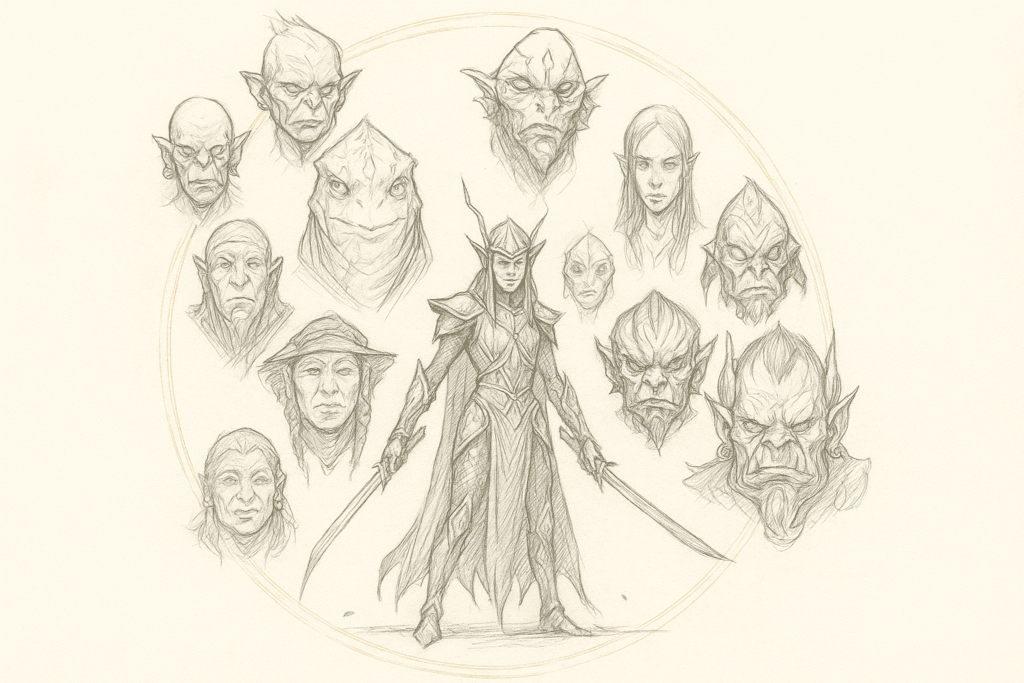Once you’ve chosen your player race in Dungeons & Dragons 5e, you might notice another exciting option: subraces. While not every race has Subraces in D&D 5e, those that do offer a deeper layer of customisation, helping you fine-tune your hero’s story, abilities, and background.
In this guide from Grim Tavern, we’ll show you why understanding subraces in D&D 5e can make character creation even more flavorful and fun.
What are Subraces in D&D 5e?
A subrace is a specialisation within a broader race. Think of it like a branch from a larger family tree. While all elves share enhanced senses and magical ancestry, a high elf and a wood elf differ greatly in culture, abilities, and worldview.
Subraces in D&D 5e usually provide:
- Additional ability score increases
- Unique traits (like new spells, resistances, or speed boosts)
- Flavorful lore for roleplaying depth
Understanding subraces in D&D 5e lets you make your character feel like a true individual, not just a generic version of their race.
Not sure which base race to start with? Our guide on choosing the right D&D 5e race breaks it down.
Why Understanding Subraces in D&D 5e Matters
1. Deepen Your Character’s Story
Subraces in D&D 5e help anchor your character into the world. Choosing a subrace can give your hero cultural traditions, societal expectations, and unique views.
For example:
- A hill dwarf might come from a proud, deeply rooted mountain community.
- A lightfoot halfling might be a nimble wanderer, always seeking the next big adventure.
Using a subrace strengthens your character’s backstory and gives your Dungeon Master rich narrative material.
2. Gain Tailored Abilities
If your main race doesn’t completely match your class or desired playstyle, a subrace often fills the gap.
Examples:
- Wood elves get increased speed and stealth bonuses—perfect for a rogue.
- Duergar dwarves resist magic and can become invisible—ideal for a tricky adventurer.
- Lightfoot halflings excel in charisma-driven roles like bard or sorcerer.
Understanding subraces in D&D 5e allows you to make mechanical choices that align beautifully with your vision.
3. Explore Unique Cultures
Each subrace often comes with its own culture, history, and traditions. When you select a subrace, you naturally answer important character questions:
- What kind of community raised me?
- How do I differ from others of my kind?
- What values or gods shaped my worldview?
Adding cultural depth through subraces makes roleplaying richer and more immersive.
See how subraces fit into the full D&D character creation process.
Popular Examples of Subraces in D&D 5e
Here are some well-known examples to help you start understanding subraces in D&D 5e:
- Elves: High elves (arcane mastery), wood elves (nature and stealth), drow (dark and mysterious).
- Dwarves: Mountain dwarves (tough and strong), hill dwarves (wise and hearty).
- Halflings: Lightfoot halflings (stealthy and charming), stout halflings (hardy and resistant).
- Tieflings (various lineages): Different infernal heritages that grant spells tied to their ancestry.
Not every race has a subrace—dragonborn and half-orcs, for example, usually don’t—but many of the classics do.

Tips for Choosing a Subrace in D&D 5e
- Start with Roleplay: Let your character’s background shape your subrace choice.
- Check Multiple Sourcebooks: New subraces appear in Mordenkainen’s Tome of Foes, Sword Coast Adventurer’s Guide, and more.
- Talk to Your Dungeon Master: Confirm what subraces are available and fitting for your campaign.
- Focus on Fun: Don’t stress about the “perfect” mechanical choice—choose what inspires you.
Final Thoughts from Grim Tavern
Understanding subraces in D&D 5e is like adding seasoning to a favourite dish. It’s not required, but it elevates your character into something memorable and special.
Whether you’re a brooding drow rogue or a hearty hill dwarf cleric, subraces offer new ways to explore your character’s story.
Looking for more beginner-friendly guides? Stay awhile here at Grim Tavern and explore our full library of player tips, character creation advice, and campaign inspiration.
Grim Tavern — Where every hero’s story begins.

